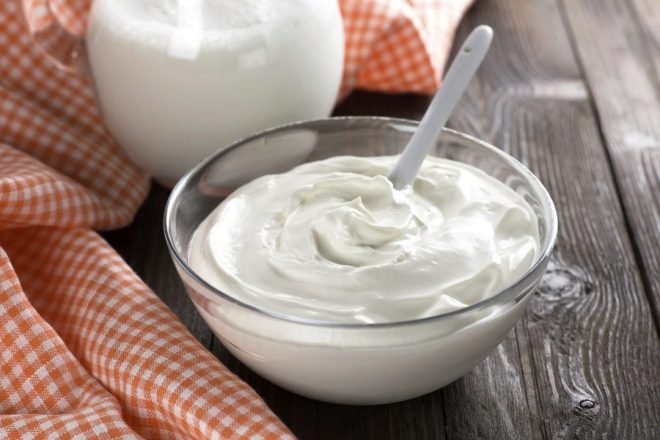At what age can you give a child sour cream?
Sour cream is a favorite product of many adults and appears on the table of our compatriots quite often. It is added to pastries, served with cheesecakes and other dishes, and even eaten separately. And when there is a baby in the family who goes to the common table, the mother is interested in how many months it is permissible to give children sour cream, what is useful and whether such a product is harmful, as well as how much and how often she can treat the children.
Benefit
- In the composition of this dairy product are present squirrelswhich are easily digested and provide valuable amino acids to the child’s body.
- Sour cream contains fatty acids and carbohydrates providing the child's body with energy.
- It contains a lot of vitamins, among which there are E, B6, D, B12, niacin, B2, folic acid, H, choline, B1 other.
- From her child will receive calcium, iodine, molybdenum, phosphorus, iron, selenium, zinc, copper, sulfur, sodium and many other items.
- Lactose in the composition is important for the absorption of calcium and is used lactobacillustherefore, it maintains the GIT microflora in normal conditions.
- Its use prevents putrefactive and fermenting processes inside the intestinal intestines, stimulating its regular emptying.
Watch a video in which the pediatrician L. Smirnova. talks about when you can start to enter into the diet crumbs sour cream and cheese:
Harm
- Some children are allergic to lactose and other substances in the composition.
- Due to the presence of saturated fats, such a product is not recommended in early childhood, as it will be digested with difficulty. Even if you give a crumb quality sour cream, but it will be with a high percentage of fat, there is a high probability of nausea, colic, diarrhea.
- Oily sour cream can provoke metabolic disorders, as well as problems in the endocrine glands, gall bladder and liver.
- Excessive use threatens overweight and diseases of the cardiovascular system.
- The store product may contain ingredients harmful to children's health.
- Stale sour cream can cause an intestinal infection. If the baby has eaten an expired product, he may have symptoms such as vomiting, loose frequent stools, painful cramps in the abdomen. When they appear, you should immediately call a doctor.
Features of the introduction to lure
From what age to give?
Most pediatricians do not advise giving such a dairy product to either infants or a one-year-old child. According to the doctors, the children's body a year can not cope with the digestion of even the low fat sour cream.
Introduce sour cream in the children's diet should be no earlier than 2 years of age. If the child has a tendency to allergic reactions, acquaintance is advised to postpone up to 3 years. Up to 2-3 years of age, it can be replaced by low-fat yogurt, as well as low-fat cream for baby food.
At 2-2.5 years old, the sour cream in the child’s menu should be low-fat (10%), and at the age of 2.5 to 3.5 years old the crumbs should be given low-fat sour cream (up to 15%). Starting to give a product with fat content from 15 to 25% is advised not earlier than 3 and a half years, and the more fatty species should not be given to children at all.
How often and how much to give?
Sour cream in childhood is recommended to include in the menu no more than two or three times a week. For a start, you should limit yourself to a teaspoon of such a dairy product at one time. But one should not rush to increase the single dose, because this product, although useful, is high-calorie.
What to cook?
Sour cream is often added to cottage cheese dishes for a child, for example, the cottage cheese is mixed with it or poured with a small amount of casserole or cheesecakes. Sour cream can also be added to cereals and soups. Besides, This dairy product is often an ingredient in vegetable or fruit salads. It is also added to boiled, stewed or baked vegetables, for example, zucchini cooked for the child, stewed in it.
No less often it is included in meat dishes, for example, a child is offered meatballs in sour cream sauce. Cooked in this sauce, turkey or chicken will be soft and tender. No less tasty and braised rabbit in sour cream. Sour cream sauce is a good complement to fish dishes.
See how you can make delicious cookies on the basis of sour cream for crumbs:
How to choose for a child?
- You should not take sour cream for children in the market, because it will not only be too greasy, but may also be dangerous due to possible non-compliance with sanitary norms.
- When buying a product for baby food, first of all you need to look at its composition. Children should receive only natural product, therefore there should not be any preservatives, stabilizers on the label. vegetable fats and other additives.
- Buy sour cream for children with a minimum shelf life - no more than 5-7 days.
- The consistency of the product will be determined by the fat content and method of manufacture. Sour cream with 10% fat is quite liquid and looks like kefir, and the product with a fat content of 15% or more has a thicker consistency.
- Carefully consider the sour cream, opening a jar. If the liquid has separated from the clots or from the main mass of the product, it is not recommended to give it to children. Also get rid of it immediately if you have an unpleasant smell or mold.
How to cook at home?
Moms who have learned how to make cottage cheese out of milk for babies think about self-preparation of sour cream. It is quite simple to make it if there is children's cream and special ferment. Mixing these two components at room temperature, you need to wait for the sour cream, and then leave them for 1-2 days in the cold. Sour cream can be in the yogurt maker.
For more information on the use of dairy products, see the program "Live Healthy".






























































